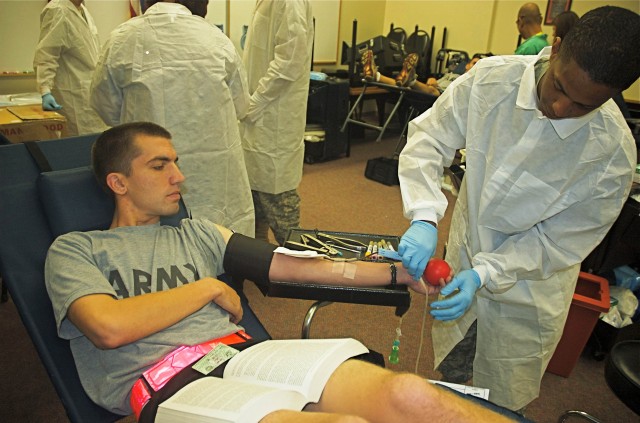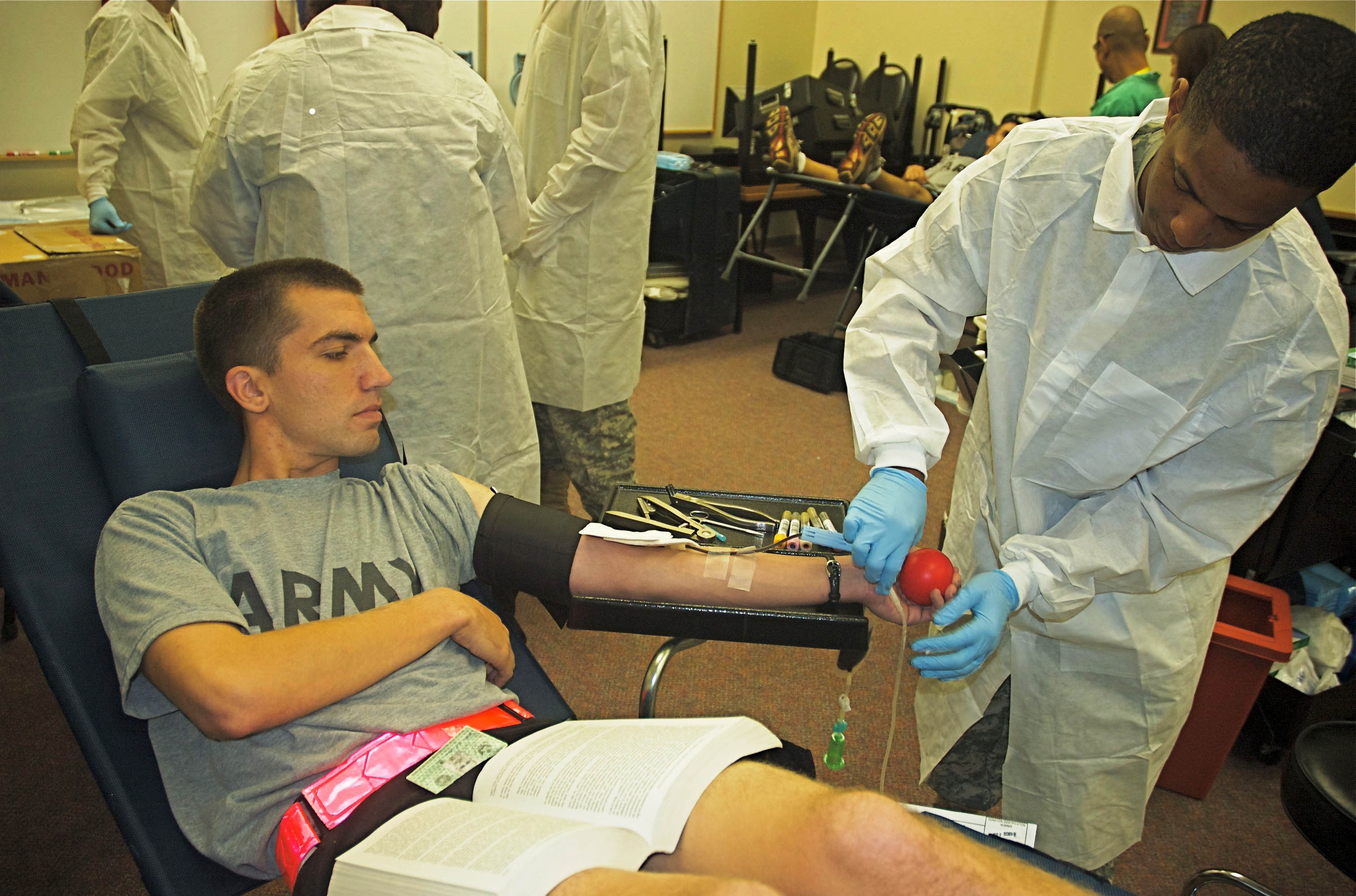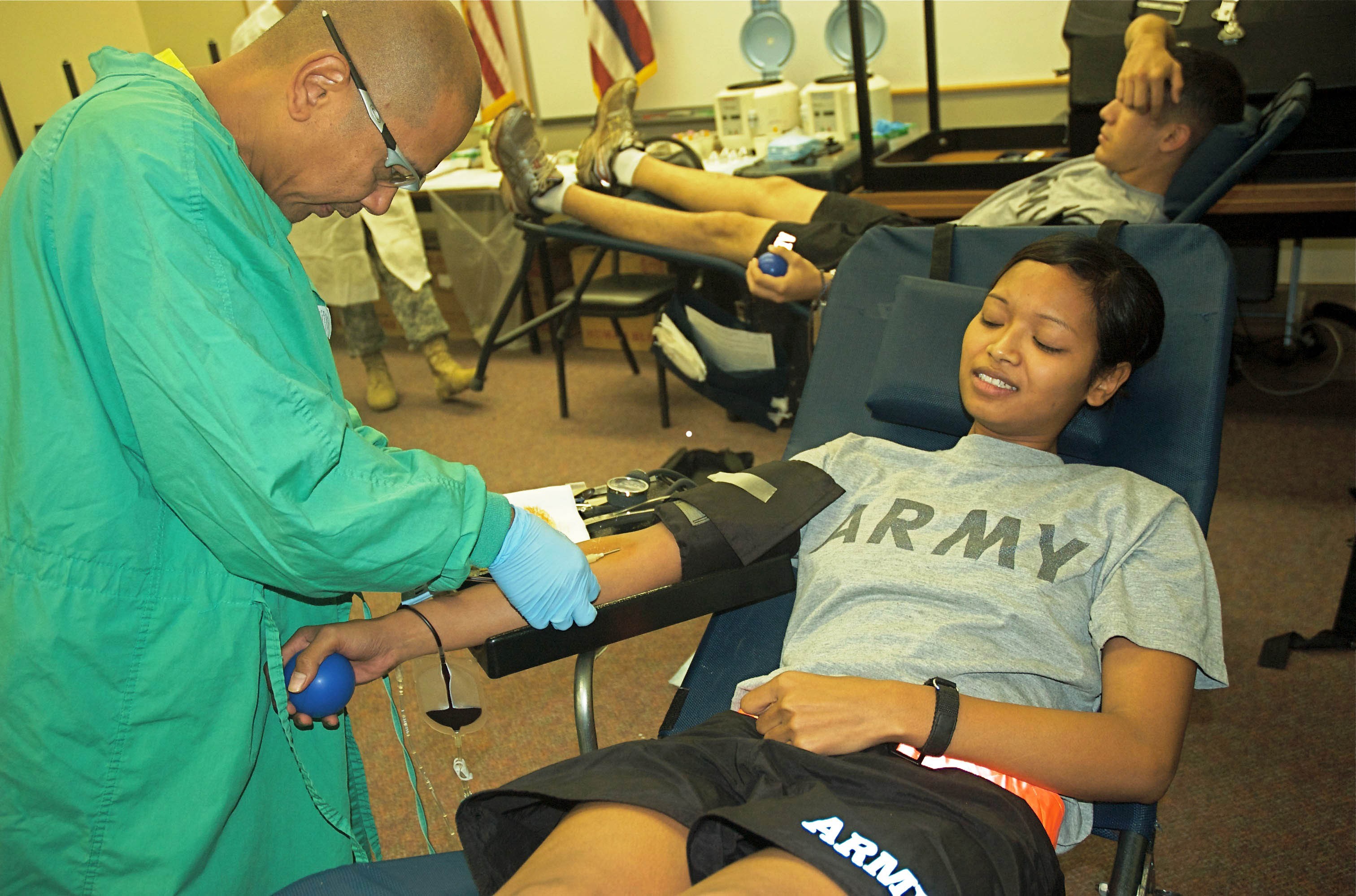TRIPLER ARMY MEDICAL CENTER, Hawaii - When it comes to assisting comrades in harm's way, the blood donor center, here, has a lifesaving reach that extends not only throughout the Pacific Rim, but also to faraway places such as Iraq and Afghanistan.
Each week, the Tripler Blood Donor Center and its team of phlebotomists draw a self-imposed quota of 200 units, or pints, from both walk-in donors and those they encounter at blood drives.
Once collected, the platelet donations are tested and then either stored at Tripler to help in local emergencies, shipped off to distant lands, where service members are deployed or routed to areas dealing with man-made or natural disasters.
Assisting the local center with the number of blood donor requests here and abroad are approximately 20 other Armed Services Blood Program centers, located within the continental U.S. and in foreign countries.
"If we had a big emergency here, it would take about 24 hours before blood could be shipped in," explained Michelle Lele, recruiter, Tripler Blood Donor Center, "so we always have to make sure we have an adequate supply of blood on hand. It's sort of like an insurance policy for us in Hawaii."
And while the center hasn't yet been asked to donate blood to Haitian residents, whose Caribbean country was rocked by a devastating earthquake on Jan. 12, Lele said the center's willingness to assist remains for any emergency situation around the globe.
"When Fort Hood had the shootings last November, we received a request to send blood there, and we did," she said, "so if an emergency arises, we're more than capable of helping out."
Still, the demands for additional blood have risen sharply in recent days. Up until last month, for example, the center was only asked to provide 20 units of blood for service members stationed in Iraq and Afghanistan.
Since then, the requested number has doubled.
"In 2010, we are hoping to collect at least 1,000 more units of blood," said Lele, adding that should the center come up short of its quota, the fallback option will be to purchase blood from the mainland.
"But that would be very expensive," she noted.
With that in mind, the push for additional blood was launched in January, on the 40th anniversary since former President Richard Nixon designated January as National Blood Donor Month.
Already, the local center has scheduled some 15 blood drives through the end of February, including dates at Fort Shafter and the Hale Koa Hotel at Fort DeRussy. (See below for dates.)
Earlier this week, Cadet Tari Rulloda was one of about 60 men and women enrolled in the Army ROTC program, Warrior Battalion, to show for an early morning blood drive at the University of Hawaii-Manoa.
Giving blood, the college junior explained, is something she manages to work into her schedule several times each year.
"I've been to Iraq before," Rulloda said, "and I know that the need for blood is important, especially when you have your comrades in battle."
By increasing the number of drives in the coming days, Lele and her team hope to ensure that the collected units of blood remain fresh, despite its perishable nature.
"Blood has an expiration date on it. That's why it's especially important that we do three or four drives per week," Lele said, "but we'll only collect on what we need. If we have a larger turnout, chances are we'll ask our donors to come back the following week."
Lele noted that despite the enthusiasm of many within the military community to contribute, deferrals, or the ineligibility to give blood, often greatly reduce the overall number of donors.
Those who travel to Iraq and Afghanistan, and other areas with identified blood-borne diseases, for example, are immediately disqualified unless they've been back home for at least 12 months.
This requirement, of course, poses an ongoing challenge since many service members are subject to repeat deployments.
"A lot of people think that just because we're on a military base that we have access to a large number of people to donate," Lele explained. "But if you think about it, how many military people have been deployed and haven't been back for 12 months' In reality, a lot of bases are redeployed before they even make the 12-month mark.
"Also, there are people who do come out to donate, who have lived in Europe between 1980 and 1996, and that makes them ineligible to donate," she continued, "so all of this makes it very difficult for us."
Despite the challenges, Lele encourages Soldiers and their family members to do their part, particularly those who have the extremely rare blood type O negative.
"Our center is open five days a week," she said, "and if businesses want to schedule a blood drive with us, we only ask that at least 25 people commit to giving blood. We don't have a mobile bus, but we're more than willing to set up shop inside an office, a conference room, a cafeteria or a chapel."
Lele added that she's also in need of new points of contact to help with upcoming blood drives. Those interested in learning more about what it takes to be a point of contact, or POC, and those wanting additional information on the center and its upcoming schedule of blood drives, can call Lele at 808-433-6699.
Upcoming Blood Drives
The Tripler Blood Donor Center has scheduled blood drives on the following dates and locations:
Aca,!AcFeb. 8, 8 a.m.-2 p.m., Kaneohe Bay Chapel (1st Battalion, 12th Marines)
Aca,!AcFeb. 12, 10 a.m.-2 p.m., Hale Koa Hotel, Fort DeRussy
Aca,!AcFeb. 17-20, 9 a.m.-5 p.m., Maui Army Recruiting Station at Queen Ka'ahumanu Center
Aca,!AcFeb. 18, 19, 8 a.m.-5 p.m., U.S. Army Reserves Center in Maui
Aca,!AcFeb. 24, 10 a.m.-2 p.m., Joint Intelligence Center-Pacific (JICPAC)
Aca,!AcFeb. 26, 9 a.m.-2 p.m., Pearl Harbor Shipyard




Social Sharing